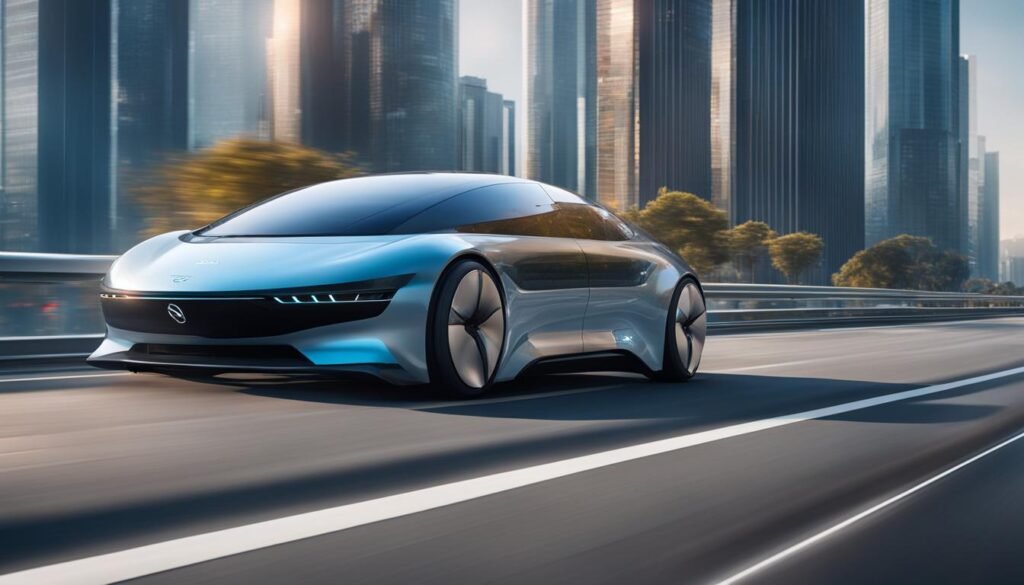
Explore the Future with AI Vehicle Automation Technology

AI vehicle automation technology is revolutionizing the transportation industry. With the advancements in artificial intelligence (AI), self-driving cars and autonomous vehicles are becoming a reality. According to data from the Association of American Railroads, rail carloads in the United States saw a decline, but intermodal containers and trailers showed an increase. This indicates the growing need for automated vehicle technology in transportation. The use of AI in the automotive industry is not only transforming the way we travel but also improving safety and efficiency. Intelligent transportation systems are being developed to enhance traffic management and reduce congestion on the roads. The future of transportation lies in AI vehicle automation.
Key Takeaways:
- AI vehicle automation technology is revolutionizing transportation with self-driving cars and autonomous vehicles.
- The use of AI in the automotive industry improves safety, efficiency, and traffic management.
- Intelligent transportation systems are being developed to reduce road congestion.
- Advancements in AI technology are driving the future of transportation.
The Benefits of AI Vehicle Automation
Self-driving cars and autonomous driving technology offer numerous advantages in the world of transportation. These vehicles have the potential to revolutionize the way we travel, enhancing safety, mobility, and sustainability.
Increased Safety: One of the primary benefits of self-driving cars is their ability to reduce accidents caused by human error. AI systems can process vast amounts of data in real-time, enabling faster analysis and response to road conditions compared to human drivers. This enhanced capability can significantly minimize the risk of accidents and save lives.
See Also... Enhancing AI User Experience: Steps Towards Success
Enhancing AI User Experience: Steps Towards SuccessEnhanced Mobility: Autonomous vehicles also provide increased mobility for individuals who are unable to drive, such as the elderly or disabled. These individuals can enjoy the freedom and independence of traveling without relying on others for transportation. Self-driving cars have the potential to revolutionize accessibility and improve the quality of life for many people.
"The development of AI vehicle automation is paving the way for a safer, more efficient, and convenient future of transportation."
Improved Traffic Flow and Sustainability: AI-powered transportation systems can optimize traffic flow, leading to reduced congestion on the roads. The ability of self-driving cars to communicate with each other and adapt to changing traffic conditions can result in smoother, more efficient journeys. Additionally, autonomous vehicles have the potential to reduce fuel consumption and emissions, contributing to a more sustainable and eco-friendly transportation system.
See Also... Exploring AI Video Game Development: A Revolutionary Approach
Exploring AI Video Game Development: A Revolutionary ApproachOverall, the benefits of AI vehicle automation are vast and promising. From increased safety to enhanced mobility and improved traffic flow, self-driving cars and autonomous driving technology have the potential to transform the future of transportation for the better.
| Benefits of AI Vehicle Automation |
|---|
| Increased Safety |
| Enhanced Mobility |
| Improved Traffic Flow and Sustainability |
Overcoming Challenges in AI Vehicle Automation
While the adoption of AI vehicle automation brings numerous benefits, there are also significant challenges that need to be addressed in order to ensure a safe and reliable transportation system.
One of the primary challenges is the development of automated vehicle technology that can effectively navigate complex traffic situations and adapt to unexpected events. The AI systems powering these vehicles must be capable of making split-second decisions to ensure the safety of passengers and other road users.
See Also... Unlock Efficiency with AI Virtual Assistants Today!
Unlock Efficiency with AI Virtual Assistants Today!Cybersecurity is another critical concern in the era of AI in the automotive industry. As vehicles become increasingly connected, there is an urgent need to protect them from potential hacking and malicious attacks. Ensuring the privacy and security of sensitive data is paramount to maintain public trust in these technologies.
Moreover, legal and regulatory hurdles must be overcome to fully implement AI vehicle automation. Establishing clear guidelines and standards for automated vehicles will be essential to ensure their safe operation on public roads. Collaboration between policymakers, manufacturers, and researchers is crucial to create a comprehensive framework that supports the widespread adoption of AI in the automotive industry.
FAQ
What is AI vehicle automation technology?
AI vehicle automation technology refers to the use of artificial intelligence in the automotive industry to automate vehicles and make them capable of driving without human intervention.
How is AI revolutionizing the transportation industry?
AI is revolutionizing the transportation industry by enabling the development of self-driving cars and autonomous vehicles, which improve safety, efficiency, and traffic management.
What are the benefits of AI vehicle automation?
AI vehicle automation offers benefits such as reduced accidents caused by human error, increased mobility for individuals who cannot drive, improved traffic flow, and reduced fuel consumption.
What are the challenges in AI vehicle automation?
Challenges in AI vehicle automation include ensuring safety and reliability, addressing cybersecurity concerns, and overcoming legal and regulatory hurdles in implementing AI technology in the automotive industry.
Source Links
- https://www.logisticsmgmt.com/article/u.s_rail_carload_and_intermodal_volumes_are_mixed_for_week_ending_november_25_reports_aar
- https://www.benzinga.com/pressreleases/23/12/g36043989/new-to-the-street-announces-five-corporate-interviews-episode-535-airing-on-the-fox-business-netwo
- https://thebossmagazine.com/remote-work-tech-essentials/
If you want to know other articles similar to Explore the Future with AI Vehicle Automation Technology you can visit the Blog category.
Leave a Reply






Related Post...